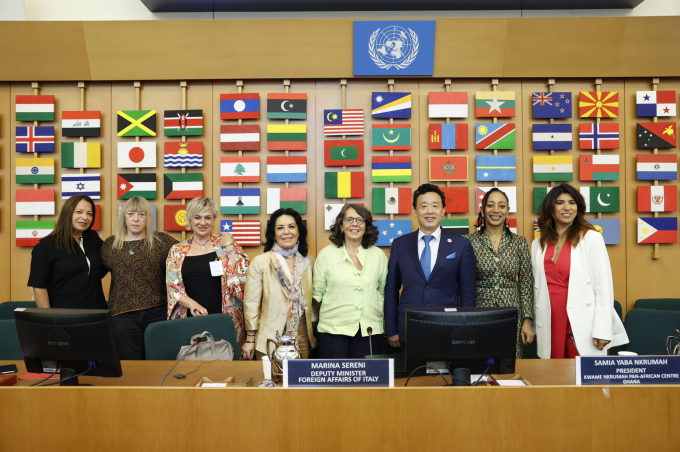June 21, 2025 | 03:26 GMT +7
June 21, 2025 | 03:26 GMT +7
Hotline: 0913.378.918
June 21, 2025 | 03:26 GMT +7
Hotline: 0913.378.918

From left: Yael Rubinstein, Ambassador-Permanent Representative of Israel to the United Nation Agencies; Jody Williams, Nobel Peace Laureate; Elena Diego, Chairperson, Spanish Parliamentary Alliance for the right to food; Ambassador Vincenza Lo Monaco, Italian Permanent Representative to FAO; Marina Sereni, Deputy Minister of Foreign Affairs, Italy; FAO Director-General QU Dongyu; Samia Nkrumah, President of the Kwame Nkrumah Pan-African Centre, Ghana; Karima Moual, moderator. Photo: FAO
Overcoming gender inequality can play a key role in freeing the world from hunger and malnutrition, the Director-General of the Food and Agriculture Organization of the United Nations (FAO), QU Dongyu, said today amid evidence that the food security gap between men and women has widened.
“Women are key actors across agrifood systems, and key contributors to agricultural and rural development,” said Qu in his address to the inaugural High-Level Dialogue, which was brought together by the Food Coalition and was entitled The impact of global crises on food security: women as key agents in transforming agrifood systems. “But if we want to build agrifood systems that benefit all people, leaving no one behind, we must overcome gender inequality,” Qu added.
There is evidence that the underlying drivers of the increase in hunger witnessed over recent years – conflict, climate shocks and economic downturns – have hit women harder than men. The food security gender gap grew even larger during the year in which the COVID-19 pandemic spread across the world, with the prevalence of moderate or severe food insecurity 10% higher among women than men in 2020, compared to 6% in 2019.
The Director-General also noted that women comprise nearly half of the rural workforce in low-income countries. Yet “everywhere, rural women face gender-based constraints that limit their potential,” Qu said.
“We must act now to transform our agrifood systems for better production, better nutrition, a better environment, and a better life for all, leaving no one behind. To reach this objective we need the full participation of women in developing and implementing solutions,” Qu said.
FAO’s programs continue to prioritize rural women's engagement and leadership, and the organization is committed to achieving “equality between women and men in sustainable agriculture and rural development for the elimination of hunger and poverty,” as set out by its Policy on Gender Equality.
The Food Coalition
The Food Coalition, launched officially in November 2020, was created to facilitate unified global action in response to COVID-19. Importantly, the role of the Food Coalition was also acknowledged in June 2021 by both the Matera Declaration and the G20 Rome Leaders’ Declaration. In light of the global food security crisis exacerbated by the war in Ukraine, the Food Coalition seeks to act as a global voluntary alliance open to all stakeholders who wish to act and accelerate the pace of change towards the transformation of agrifood systems.
The Food Coalition is structured on five complementary pillars, including: Pillar 1 - Response to and recovery from global crises; Pillar 2 - Advocacy for solutions; Pillar 3 - Support and follow-up to G20 Matera Declaration; Pillar 4 - Longer-term solutions developed to transform agrifood systems; and Pillar 5 (Cross-Cutting) - Knowledge sharing and transfer of experts/expertise.
The High-Level Dialogue, organized under the Advocacy for Solutions Pillar of the Food Coalition, also sought to discuss how conflicts, in particular the war in Ukraine, lead to increasing levels of food insecurity. In his opening remarks, the FAO Director-General reiterated: “Conflict remains the single greatest driver of hunger in food crisis hotspot countries,” in a reference to a report launched by the Global Network Against Food Crises (GNAFC).
The report showed that the number of people requiring urgent life-saving food assistance and livelihood support continues to grow at an alarming rate. Approximately 193 million people in 53 countries or territories experienced acute food insecurity at crisis or worse levels in 2021. This is an increase of nearly 40 million people when compared to the numbers reported in 2020, which already represented a record high.
Today’s event was attended by, among others, Nobel Peace Laureate, Jody Williams; Italian Deputy Foreign Minister, Marina Sereni; Morocco’s Minister of Solidarity, Social Inclusion and Family, Aouatif Hayar; President of Kwame Nkrumah Pan African Centre, Samia Nkrumah; and Chair of the Spanish Parliamentary Alliance for the Right to Food, Elena Diego.
(FAO.org)

(VAN) Poultry production in Poland, which has only started recovering from devastating bird flu outbreaks earlier this year, has been hit by a series of outbreaks of Newcastle disease, with the veterinary situation deteriorating rapidly.

(VAN) Extensive licensing requirements raise concerns about intellectual property theft.

(VAN) As of Friday, a salmonella outbreak linked to a California egg producer had sickened at least 79 people. Of the infected people, 21 hospitalizations were reported, U.S. health officials said.

(VAN) With the war ongoing, many Ukrainian farmers and rural farming families face limited access to their land due to mines and lack the financial resources to purchase needed agricultural inputs.

(VAN) Vikas Rambal has quietly built a $5 billion business empire in manufacturing, property and solar, and catapulted onto the Rich List.

(VAN) Available cropland now at less than five percent, according to latest geospatial assessment from FAO and UNOSAT.

(VAN) Alt Carbon has raised $12 million in a seed round as it plans to scale its carbon dioxide removal work in the South Asian nation.